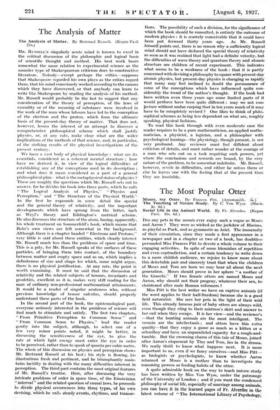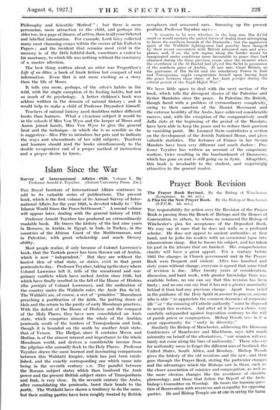The Most Popular . Otter • 3s. 6d. ) Dm any
pets in the annals ever enjoy such a vogue as Moses and Aaron ? They were as wicked as the jackdaw _of .Rheims, as playful as Puck, and as gymnastic as Ariel. The immensity of their circulation, since they made a first appearance in a newspaper and in a chapter or two of a book, has doubtless persuaded Miss Frances Pitt to devote a whole volume to their engaging activities. In spite of some blemishes of repetition and even contradiction, and a certain tendency to write down to a more childish audience, we rejoice to know more about this delectable pair, and sincerely trust that when the children of Moses and Tom are born we may hear all about the next generation. Moses should prove in her sphere " a mother of the Gracchi." If two female otters are named Moses and Aaron, why should not their progeny, whatever their sex, be christened after male Roman reformers ? Miss Pitt is the best writer we have on captive animals (if the word applies to their half-freedom) because she is a good field naturalist. She sees her pets in the light of their wild life. This already famous pair of baby otters are always wild, even though they cling to their mistress's skirt and answer to her call when they escape. It is her view—and the reviewer's —that the hunting animals are the most intelligent. The vermin are the intellectuals ; and otters have this extra quality—that they enjoy a game as much as a kitten or a schoolboy and have an unparalleled capacity for a rough-and- tumble. But the crowning charm of this tale of Moses, joined after Aaron's elopement by Tiny and Tom, lies in the drama. We really thrill to know what happens next. It is more important to us, even if we fancy ourselves—and Miss Pitt— as biologists or psychologists, to know whether Aaron returned or Moses is a mother than to investigate the reasoning powers or feeding habits of the otter. A quite admirable book on the way to teach nature study has been written by Miss Von Wyss, under the patronage pf the University of London ; and if you want the condensed philosophy of social life, especially of marriage among animals, you can have it in. the learned pages of Fr. Alverdes in tfie latest volume of " The International Library of Psychology,
Philosophy and Scientific Method " ; but there is more persuasion; more attraction to the child, and perhaps the elder too, in a page of drama, of action, than in all your ticketed and labelled informatiOn. For example, Lord Grey collected many most charming essays within the covers of his Fallodon Papers ; and the incident that remains most vivid in the memory is of the little faithful duck, sometimes a visitor to his sanctuary, to which life was nothing without the constancy of a master affection.
The beSt thing written about an otter was Tregarthen's Life of an Otter, a book of frank fiction but compact of real information. Even that is not more exciting as a story than the life of Moses.
It tells you more, perhaps, of the otter's habits in the Wild, with the single exception of its feeding habits, but not So much of its psychology. A better children's book was seldom written in the domain of natural history ; and it would help to make a child of Professor Dryasdust himself.
Teachers of natural history need doubtless rather different books than learners. What a vivacious subject it would be in the schools if Miss Von Wyss and the keeper of Moses and Aaron joined hands, Miss Von Wyss to give the general bent and the technique—in which she is as sensible as she is suggestive—Miss Pitt to introduce her pets and to indicate the ways and whereabouts of her wild subjects. Teachers and learners should read the books simultaneously to the double co-operative end of a proper method of instruction and a proper desire to know.







































 Previous page
Previous page